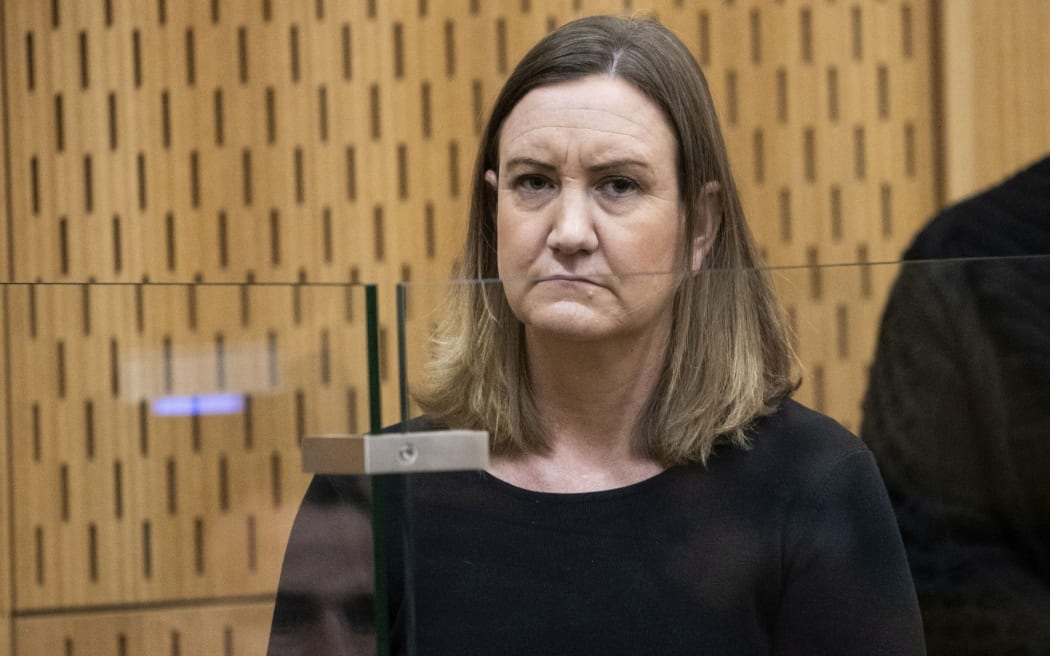
Lauren Anne Dickason in the High Court at Christchurch, on 17 July 2023. Photo: Pool / NZME / George Heard
Warning: This story contains distressing content.
A forensic clinician has told a jury that Lauren Dickason's mental health was badly deteriorating at the time she killed her children, and there is legitimate grounds for an insanity and infanticide case.
Further evidence from another psychiatrist - the second expert witness called by the defence - was heard on Tuesday as the murder trial continued into a seventeenth day.
The Crown later raised doubts about the second clinician's testimony, again highlighting the fluctuating and variable nature of the details heard in court.
Dickason is defending three charges of murder following the death of her three young daughters, two-year-old twins Karla and Maya, and their older sister Liané (6) at their Timaru home on 16 September 2021.
The 42-year-old admits she killed her daughters, but has pleaded not guilty to murdering them.
The defence case is built upon arguments of insanity and infanticide.
Dr Justin Barry-Walsh first interviewed Dickason, exactly three months after the killings. He described the woman's bleak outlook during their meeting.
"It was the three month anniversary of the death of her children, and she was telling me if anything, her mood was lower than what it had been.
"She described waking up that morning as a 'kick in the guts', that she had no future and just wanted to die.
"She told me she was missing the kids a lot as well."
It had been a similarly grim view for the mother only a few months prior upon arriving in New Zealand in August 2021. Barry-Walsh said Dickason was "overwhelmed by the world" during this period.
"Killing her children seemed right... she noted the world was gripped by the Covid pandemic, that everyone was wrapped up in cellphones and she was concerned about the future and all the worries ahead of her.
"She considered her children would be better off dead."
Defence lawyer Anne Toohey asked the clinician about whether the mother had fully recovered from postpartum depression between the time the twins were born and the night the three girls died.
He believed she had not, but said it was not clear cut.
"This is not an easy task, there has to be some uncertainty about this. I think there are pros and cons to this, there is evidence that does go both ways."
The jurors heard about Dickason's improved well-being, underlined by moves to stop taking her antidepressants in early-2021. But Barry-Walsh did not believe she had fully recovered and said it was likely she was in need of "more treatment" around the March-April period.
Toohey asked him about Dickason's motives for the killings. The clinician believed there was an altruistic motive and that she did not appreciate the moral wrongness of her actions.
"I considered that the motive for killing the children was her suicidal thinking and she also believed the children were better off dead.
"She was in the grips of rapidly worsening depression... not only overwhelmed by viewing the world through a negative and nihilistic lens... she believed killing the children was morally correct at the time."
The expert later faced cross-examination by the Crown.
Prosecutor Andrew McRae suggested to the expert, who had to travel, that his interviews with the defendant were potentially rushed. Barry-Walsh conceded it was a possibility but felt confident he had obtained a comprehensive background.
McRae also asked Barry-Walsh why he halted an interview when the defendant discussed the events of 16 September. He said she appeared to be "suffering and in distress", despite assurances she was fine to continue.
Other details, including an apparent lack of discussion over Dickason's text messages, and her internet searches - the latter which were never disclosed to Barry-Walsh - were pointed out by the prosecution.
McRae asked if this was an example of the woman not being upfront with the doctor.
"It is clear she had more thoughts of harming the children than she talked to me about," Barry-Walsh said.
Cross-examination will continue on Wednesday.
Where to get help:
If it is an emergency and you feel like you or someone else is at risk, call 111.
Need to Talk? Free call or text 1737 any time to speak to a trained counsellor, for any reason.
Lifeline: 0800 543 354 or text HELP to 4357
Suicide Crisis Helpline: 0508 828 865 / 0508 TAUTOKO (24/7). This is a service for people who may be thinking about suicide, or those who are concerned about family or friends.
Depression Helpline: 0800 111 757 (24/7) or text 4202
Samaritans: 0800 726 666 (24/7)
Youthline: 0800 376 633 (24/7) or free text 234 (8am-12am), or email talk@youthline.co.nz
What's Up: free counselling for 5 to 19 years old, online chat 11am-10.30pm 7days/week or free phone 0800 WHATSUP / 0800 9428 787 11am-11pm
Asian Family Services: 0800 862 342 Monday to Friday 9am to 8pm or text 832 Monday to Friday 9am - 5pm. Languages spoken: Mandarin, Cantonese, Korean, Vietnamese, Thai, Japanese, Hindi, Gujarati, Marathi and English.
Rural Support Trust Helpline: 0800 787 254
Healthline: 0800 611 116
Rainbow Youth: (09) 376 4155
OUTLine: 0800 688 5463 (6pm-9pm)
Family Violence
Women's Refuge:(0800 733 843
It's Not OK 0800 456 450
Shine: 0508 744 633
Victim Support: 0800 842 846
HELP Call 24/7 (Auckland): 09 623 1700, (Wellington): 04 801 6655 - push 0 at the menu
The National Network of Family Violence Services NZ has information on specialist family violence agencies.



